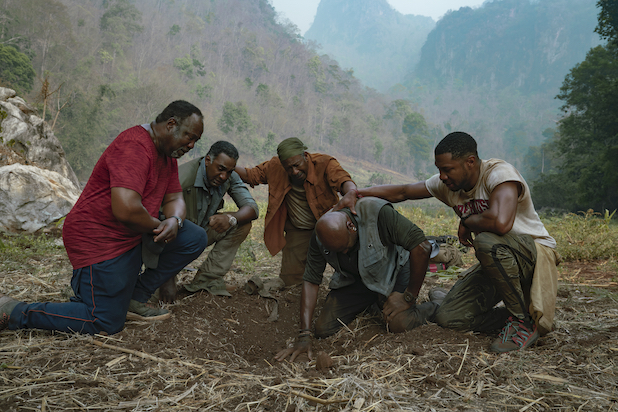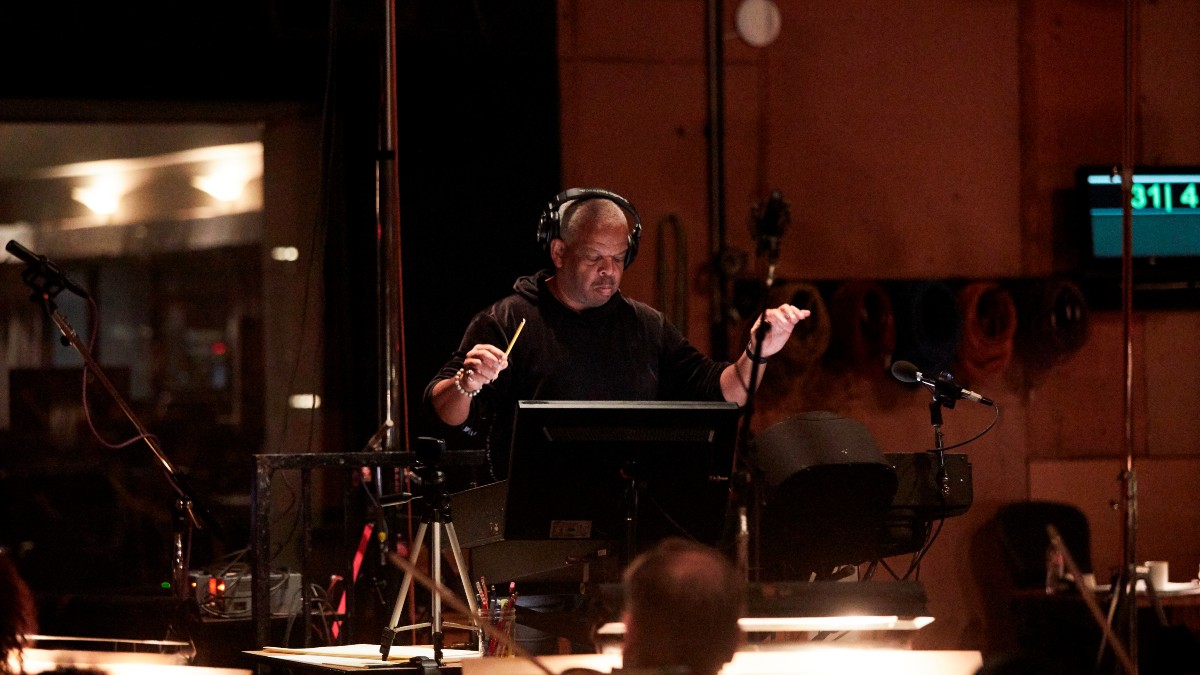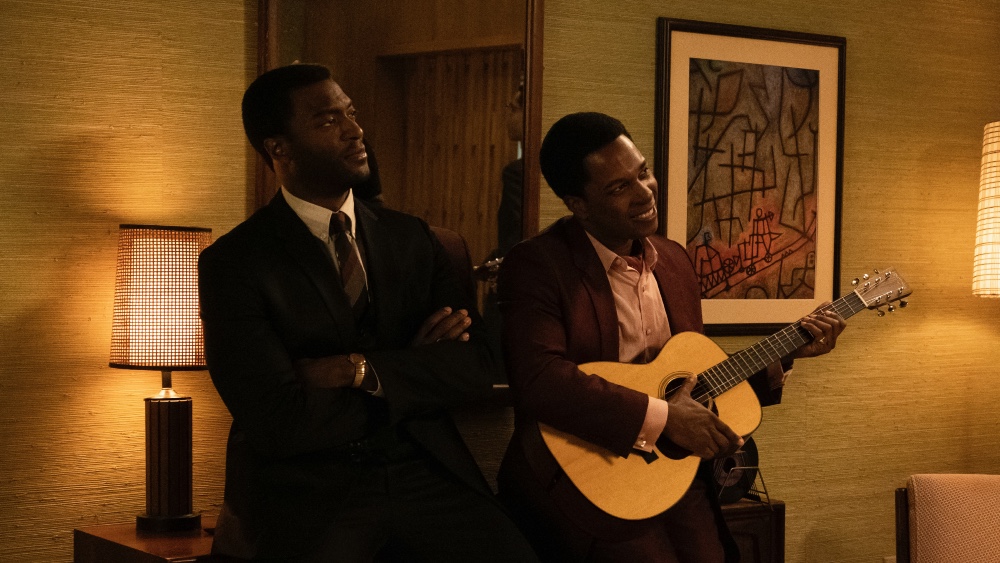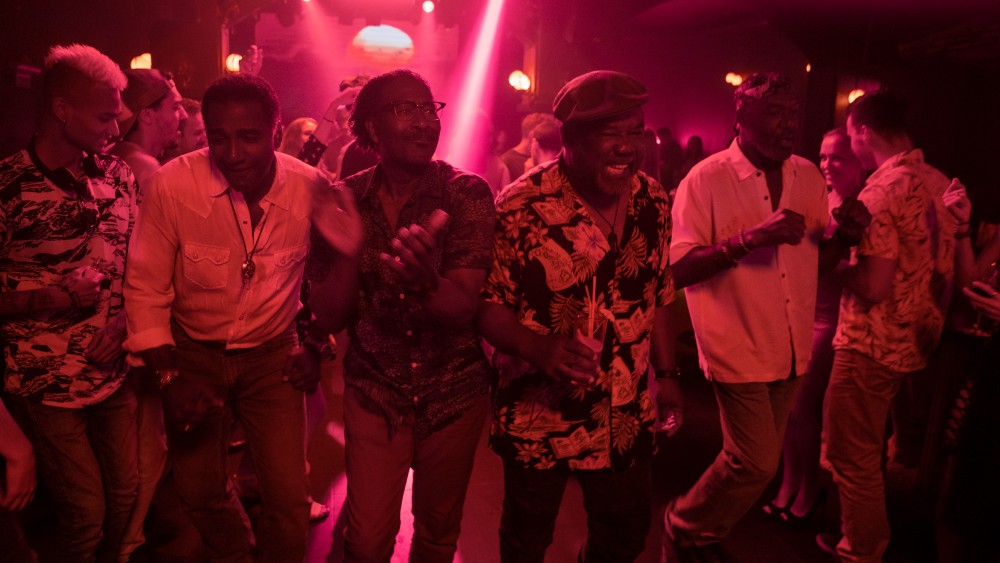Beginning with Jungle Fever in 1991, Musician and Composer Terence Blanchard has been Spike Lee’s go-to guy for enhancing his films and television with just the right musical score. If you think about the variety of genres and tones that Lee brings to his work from biopics like Malcolm X to more mainstream crime-thrillers like Inside Man, right up to 2018’s Oscar-winning BlackKklansman, it’s a little shocking it took until that last one for Blanchard to get an Oscar nomination.
Clearly, Blanchard’s work has finally been connecting with the Academy’s music chapter, because they have nominated him again for Lee’s latest, Da 5 Bloods, a Vietnam-set epic that follows five war vets who return to the Southeast Asian country to retrieve a cache of gold bullion that they left behind on returning home forty years earlier.
Blanchard’s score is pretty amazing on its own, between the driving melodies that add excitement to the war sequences or the more emotional moments as each of the men face their pasts. And then you compare that to Blanchard’s score for Regina King’s narrative feature directorial debut, One Night in Miami…, for which they went with straight piano music to counter-balance the Sam Cooke tunes, as performed by Oscar-nominee Leslie Odom, Jr.
Below the Line got on the phone with Mr. Blanchard for the following interview in which we learned a lot about the creative process and the collaboration he has with Spike Lee, as well as his music for Ms. King’s film.
Below the Line: Congrats on your second Oscar nomination after thirty years working with Spike. It’s a pretty amazing run, so it’s crazy that people are only just discovering what amazing work you’ve been doing together all these years.
Terence Blanchard: [Laughs] Oh, thank you.
BTL: I actually was familiar with the music you did before with the Jazz Messengers when I moved to NYC in the ’80s, but what eventually got you into scoring and working with Spike in the first place?
Blanchard: Just from being a session player, man. You know, some of [Spike’s] earlier films — School Daze and all those things — there was a guy named Harold Vic, who was a saxophonist, who was contracting the big bands for the sessions. I just got a call and just being on the sessions, watching Spike’s father, piqued my curiosity about wanting to do this. Even with that, I still didn’t think it would happen. I was just saying to myself, “Well, this is kind of cool, being able to write music to picture and everything like that. This is kind of a cool gig to have.”

BTL: Were you playing other instruments besides trumpet at that point? I know you were probably writing music back then, too, but did you write on other instruments?
Blanchard: No, no, no. I just had my band–I was touring with the band and just making records, man, that was it. I play piano, but I’ve been playing piano since I was a little kid. That’s how I started on a piano, and once I got to New York, my focus was on being a jazz performer, and then all of a sudden this realm of creativity popped up into my lap, and I just had to take advantage of it.
BTL: Had you ever performed on piano, or do you use it just to write?
Blanchard: It’s funny that you ask that. When I was in Art Blakey’s band, I would play the piano when the pianist would drink coffee, and it would make him go to the bathroom.
BTL: So you were doing double duties.
Blanchard: Yeah, it wouldn’t happen too often, though. Just a couple of times.
BTL: You’ve worked with Spike for so long, so at what point does he tell you, “Okay, this is going to be my next movie”? Are you involved fairly early on in the development process?
Blanchard: Yeah, he always calls me before they start to shoot. He’ll tell me, “I’m getting ready to do this–I’m gonna send you a script to read.” I get the script just when everybody else gets a script, so I have an idea of what the story is before they start to shoot and while they’re shooting. That helps me to start formulating ideas about what it is you want to do.
BTL: Spike does tend to use existing songs in his work, as he does with Da 5 Bloods, so do you need to know that kind of stuff beforehand?
Blanchard: Of course. I mean, you want to know. A lot of times in film, you don’t really get a chance to, but with Spike, he’s really great about that. I want to know, because you want to be able to create pacing. If a certain song has a certain type of energy, you don’t want the score to butt up against that with the same type of energy if the scene is something else. So it’s all about finding a rhythm for the film and having nailed down what those songs are to begin with really helps
BTL: Is Spike just sending you the script to read or are you two already having conversations about the music, and especially with Da 5 Bloods, what kind of conversation did you have about the tone of the movie?
Blanchard: He’ll send me a script, and I’ll read it, and then he’ll start shooting. Sometimes, he’ll start sending me little clips to look at. Generally, what he does is when he starts to edit, I’ll start sending him some themes to go through. When he gets them, he says, “I’m going to use this for this, I want to use this for that, and then we just kind of go from there. He doesn’t really hear a lot of demos– he’s not a demo guy, never been — he just wants you to show up to the stage prepared and ready to go.
BTL: But he wants to have music from you before he goes to the edit just to have something to cut to or is a lot of it still done after he has a first edit?
Blanchard: The only thing he gets from me while he’s editing are piano melodies. It has to be done on a piano for him. That’s the way he can hear it, which is smart because then he’s not hearing orchestration, he’s just hearing the basic melodic and harmonic content. But then after we select all of that stuff then we move into the next phase of just me writing and then we start to set dates for a session, and then we’re off and running.

BTL: Do you have a particular studio where you do most of your recording with an orchestra?
Blanchard: It’s changed over the years. We used to use Manhattan Center Studios in New York in the early days, and then we recorded a couple of scores at Air Studios in London, but now, it seems like we’ve been going to the Sony Stage a lot in L.A.
BTL: Having worked together for so long, does he reference other music you’ve done for him before when talking about new films, because the amount of music you’ve written for him is incredible so does he reference previous collaborations?
Blanchard: The closest he’s come to that with this one is that he said, “It’s gotta be big like Malcolm X.” That’s the only thing he said, but no, we never really do that.
BTL: There are definitely some comedic aspects to Da 5 Bloods even though it’s very dramatic and serious, so are you ever asked to play up the comedic aspects or add to them with the music?
Blanchard: Oh, no no no no no, he never really asked me to do any of that stuff. Sometimes, I think part of what makes things funny in his films, which is a little different from other films, is sometimes I play up the comedy, but a lot of times, I try to shy away from it, because it seems like it’s inappropriate in a Spike Lee film sometimes. Because I think what makes things funny is that juxtaposition of that humor against what’s already been happening in the film. Like in the scene where Clarke Peters’ character finds out he has a daughter. I try to play up to humor in that by omission, by giving him space and letting the lines carry the weight of the comedy as opposed to trying to push that button. In a Spike film — I’m not sure if he’s noticed — but I’ve tried that and when I’ve tried it, it just seems a little too over-the-top, and it just unnecessary. With his films, he always has great actors, he has great performances, so the thing for me is just to really get out of their way.
BTL: I’m glad you mentioned that Clarke Peters scene, because it was one of my favorite musical moments in the movie and your score. You have all this big war and action music in the movie but then there’s this really nice human moment that contrasts with it.
Blanchard: But I think the main part about it is that his character is hanging out with his boys, but when he’s going to see his ex-lover that’s a very intimate, private moment. The energy in the scene is so different from what we’ve just witnessed with the other four Bloods, so for me, it’s like i’ve been telling everybody about Spike’s films in general and especially Da 5 Bloods, the editing, the acting, the lighting, everything was so amazing there was no need for me to like push or try to embellish. I just needed to be right there with the actors. That’s all. And that’s what I tried to do throughout the entire film. I didn’t try to push anybody’s buttons or anything– I just tried to let them let their performances tell the story and just help enhance that.

BTL: I also want to talk about working with Regina King on her movie, One Night in Miami… That score is very different being a little more piano-driven score for that one. What were the conversations with her like, that being her first feature film as a director.
Blanchard: It was a brilliant experience I had working with Regina, because I think she’s amazing, I think she’s really smart, she’s extremely talented, obviously. We’ve known that for years. And the directing thing, she has a really strong talent for. When we first started working together, I’d given her some suggestions about trying a couple of approaches to score to film. She really wanted to have just a single instrument, but she was open about listening to everything that I would throw at her. She came back to the piano, and when we sat that alone, it really worked really well with the film. It was an interesting exercise for me, because then everything about the piano became bigger, like the dynamics, the touch, the attack, the range. All of those things became extremely important and having variables to help tell the story.
BTL: Do you have a specific pianist you work with when it comes to scores that are piano-driven like that one?
Blanchard: No, no, no, no, no. I mean, I love Benny Green, and he’s been a good friend of mine for a number of years. I’ve been a fan of his, and she was a fan of his as well. So when I started… well, most of us were already available, because of COVID, but when I saw that he was available, I immediately called him up and said, “Hey, man, what about doing this project?” And he jumped all over it.
BTL: I spoke to someone else who said that they had to finish shooting in L.A. last August because things stopped during COVID, so at what point were you writing stuff for Regina’s movie? Was that after COVID hit?
Blanchard: I think they had shot just about the entire movie. There were a couple of things they had to go back and reshoot, but no, I think most of the film was already done.
BTL: Because those Sam Cooke songs are such a big part of the movie, did that change your approach to the score where you had to know where those songs would be placed?
Blanchard: It’s the same thing, like I was saying about Spike’s film. You want to know what those songs are, just so you can create a pacing, kind of set a pace for the film, or not necessarily set a pace, but find out what the pace should be for the film. That all has to do with knowing what those songs are, watching a film reel by reel and getting a sense of the timing and tempo of everything that occurs. So it helps me to think, “Okay, well, we just came out of that song two minutes ago, and even though people haven’t heard music in two minutes, that song is still resonating in people’s ears. So let’s see, if we need a little more breath between that before coming with another piece of music.” Things like that make it important to know what the songs are.
BTL: Do you generally only work on one movie or project at a time or are you multitasking by writing for one while recording another, etc?
Blanchard: One project at a time, man. I’m not trying to multitask or kill myself — life is too short.

BTL: How’s that work with some of the TV projects you score? I assume that’s more time-consuming than scoring a movie? Or is that not the case?
Blanchard: Not necessarily, because when you start to establish what the musical identities are of their score for television, it just generally kind of writes itself. It’s just a matter of going back in and saying, “Okay, but what does the scene need? Oh, it needs tempo? Well, this is a rhythmic thing… ” You know what I’m saying? It’s not like you’re bringing in new elements all the time. While you can modify those elements — there’s different things you can do — you’re still set within the context of that initial sound palette that you created for the show. It is a lot of work, but it’s not as arduous as you may think, because the creative part of designing a sound for the show was already done with the first episode.
BTL: A lot of these shows you’re scoring have multiple directors coming in with each episode, so is it difficult to transition from one episode to the next or is that all set up with the pilot?
Blanchard: With Perry Mason, it was interesting. I just dealt with Tim Van Patten. With Shots Fired, they had other directors, but I dealt with Reggie Bythewood. I’m finishing this show with him now, Swagger, the same thing — I’m just dealing with him. It keeps the consistency intact, which allows us to work a little quicker and more efficient.
BTL: Have you been doing any other recording outside of these couple projects?
Blanchard: Nothing during COVID, man. It’s just been the TV projects and film projects that’s it. I’ve been laying low. I won’t start performing again, probably until September. I’ve just been taking it easy, teaching and writing, that’s it. That’s what I’ve been doing for a year.
BTL: Do you generally go around touring still?
Blanchard: Oh, yeah, yeah. We’re always touring all the time. I have a band called The E-Collective, and we have a record in the can right now. It’s the music of Wayne Shorter, which the E-Collective and the Turtle Island String Quartet. We don’t know when we’re going to release it, but we’re going to finish it up pretty soon,
BTL: How have you found recording with COVID? Have you found ways to work? Some composers I’ve spoken to don’t like doing the Zoom thing, although to me, it just seems like doing stuff over Zoom is just like being in the control room communicating with the musicians in the studio.
Blanchard: The cool thing about it — I haven’t had to do a lot of it — with Perry Mason, we had individual musicians record at home, and then they would just send in the tracks, and we would edit them and put it all together. One Night in Miami… is just piano, so I was on a Zoom with Bennie, while he was in the studio doing it. It’s been pretty painless so far. I haven’t had to do like a big orchestral thing as of yet during this period.
BTL: I’ve spoken to one composer who basically just works with a smaller orchestra and then has them doubling everything. It’s been really interesting to see what’s being done in COVID to get work done.
Blanchard: That’s how things become invented. Because of the situation, you start to learn how to get things done.
BTL: Do you think you’ll personally change how you do anything going forward due to COVID?
Blanchard: I mean, I think we’re all gonna change a little bit. I think everyone is going to become a little bit more of a hypochondriac.
This is an unprecedented time we’re living in, so the thing that I love about it is the fact that people who are dedicated to their craft have found ways to be creative and bring stuff to the table to help people heal during this time. One of the things about Da 5 Bloods that I was most proud of is that at a time where people were shut-in in their homes and wondering what was going to happen, we had something out there that could give them a little break from all of that madness. I was really proud about having that and the same thing with Perry Mason. With Perry Mason, people were looking forward to staying home inside and watching Perry Mason every week and that was something that I felt proud about, more than just working on a TV show but actually contributing to the health and well-being of the country. That was a big thing for me.
BTL: All the artists who just kept working and making things and releasing things, it was greatly appreciated by everyone.
Blanchard: Thank you. I appreciate you saying that.
Da 5 Bloods can be viewed via streaming on Netflix, while One Night in Miami… is streaming on Amazon Prime Video.
You can check out a track from the soundtrack for Da 5 Bloods below.





